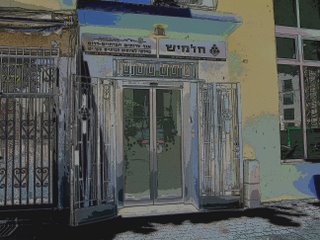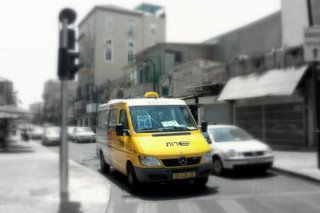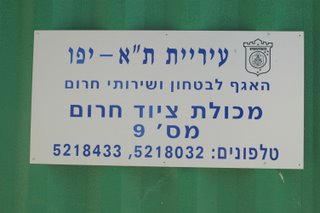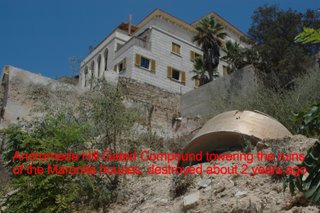Jaffa beach privatized....
 Jaffa has a lovely beach, Jabaliya beach, or, as it is called in Hebrew, "Givat Aliyah Beach".
Jaffa has a lovely beach, Jabaliya beach, or, as it is called in Hebrew, "Givat Aliyah Beach".Jabaliyah was the name of a small Palestinian fishermen's hamlet, just south of Jaffa.
Over the years (before 1948) it developed and became a part of Jaffa. "Jabaliyah" is also the name of the Gaza refugee camp, to which many of Jabaliya's residents escaped in 1948.
The Hebrew name Givat Aliyah sounds like Jabaliyah, although in it really means "Hill of the (Jewish) Migration to Israel".
Jabaliyah Beach today is one of those places in which Jaffaites from all social strata and ethnic groups meet, Al Ajami's Palestinians and gentrifying Jewish yuppies, recent migrants from the ex-Soviet Union territories, who live in Jaffa's public housing estates (Yafo Daled and Yafo Gimmel), Ethiopian jews, "illegal" labor migrants from Jordan, Egypt as well as Palestinian laborers who have managed to sneak into Israel for work purposes from the Gaza strip, children & adults, young boys washing their horses and donkeys in the sea water, women in tini bikinis next to fully dressed devout Muslim women; During the early morning and late evening hours you can still encounter many fishermen.
We all meet at the beach and enjoy a slice of cold water melon or an icicle, while hearing the shouts of the lifeguards in both Hebrew and Arabic telling this child or that woman to "immediately get between the flags", where they can be watched, as today the currents and waves are high, strong and dangerous".
The beach has well developed facilities, bathrooms, changing rooms and a first-aid post, all for free. There is lots of parking space.
That is, when the facilities are avaiable. Lately we have seen more and more occasions on which private companies simply cordon off a part of the beach and ALL of the facilities in order to hold private parties.
They put guards at the entrance to keep us out.
The beach is public and belongs to all of us. The facilites are there to serve the Jaffa population, not party goers from north Tel Aviv who want an "authentic Jaffa evening on the beach" while guarded by their own gorrillas so, money forbid, one of us might sneak in and grab a pita from the buffet.
Seeing it stolen from us by the well-to-do with their catering services, security companies and Dj's REALLY pisses me off.
The image shows an event organized by a company called "artnet" for their staff and select customers, yesterday evening.








